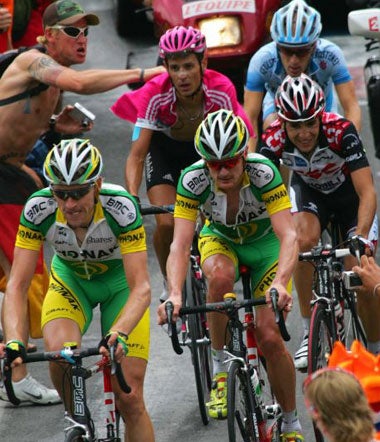Tour de France: Landis's stock rises on ascent of Alpe d'Huez

Your support helps us to tell the story
From reproductive rights to climate change to Big Tech, The Independent is on the ground when the story is developing. Whether it's investigating the financials of Elon Musk's pro-Trump PAC or producing our latest documentary, 'The A Word', which shines a light on the American women fighting for reproductive rights, we know how important it is to parse out the facts from the messaging.
At such a critical moment in US history, we need reporters on the ground. Your donation allows us to keep sending journalists to speak to both sides of the story.
The Independent is trusted by Americans across the entire political spectrum. And unlike many other quality news outlets, we choose not to lock Americans out of our reporting and analysis with paywalls. We believe quality journalism should be available to everyone, paid for by those who can afford it.
Your support makes all the difference.The Tour's most famous climb, Alpe d'Huez, saw the American Floyd Landis return to yellow, but his lead is - as yet - far from secure.
In marked contrast to the more aggressive style of the former overall winner Lance Armstrong in the mountains, Landis played a supremely tactical game on the 14-kilometre ascent.
With the stage win going to Fränk Schleck from a group of early breakaways, rather than try and pull Schleck's move back and go for the victory himself - as Armstrong would most likely have done - the Pennsylvanian bided his time.
It was only when the German Andreas Klöden and his team-mate Matthias Kessler began to shred the field on the Alpe's steeper lower slopes that Landis moved in line behind them. "I wanted to play it conservatively, not take too many risks." Landis said. "If I don't get any stage wins but take the race overall, then so be it. My goal is yellow in Paris."
The rider who benefited the most from Landis's defensive strategy was undoubtedly Shleck, victorious in the Tour's most prestigious mountain stage the first time he has taken part in the race. Just 26 years old, the Luxembourger dropped his most persistent rival, the 2004 Tour of Italy winner Damiano Cunego, two kilometres from home before continuing alone.
For a rider on the point of giving up cycling in 2004 because no team would hire him, a win on Alpe d'Huez - an ascent which Luxemberg's most famous climber and 1958 Tour winner, the late Charly Gaul, never conquered - represents a major turnaround in his fortunes.
"Signing for CSC was crucial for me." Schleck said. "They helped my confidence grow and today, where before I would have been too nervous to attack, I moved ahead."
Behind, the overnight leader Oscar Pereiro floundered, Landis and Klöden formed a working alliance and succeeded in shedding two of their main rivals for overall victory, the Australian Cadel Evans and the Russian stage winner in the Pyrenees, Denis Menchov.
Brief but timely support appeared for Landis and Klöden in the shape of team-mates who had waited for them from Schleck's winning move as the ski resort at the summit finish approached. The pairfinished fourth and fifth respectively, gaining just enough advantage for Landis to regain the yellow jersey from Pereiro by a slim 10-second margin.
Ignoring the Tour legend that whoever leads on Alpe d'Huez will win in Paris, Landis said: "I would not have objected if Pereiro had continued as leader. But I couldn't afford to let Klöden take any time on me, either."
Landis prefers to tighten the screws on his rivals slowly - a tactic which he says he will repeat on the remaining two Alpine stages, and will almost certainly bring him fresh criticism for failing to launch an all-out attack. "Anybody who says that doesn't understand cycling," Landis retorted. "This is a tactical game, and for now my tactics are working."
Alasdair Fotheringham writes for 'Cycling Weekly'
Join our commenting forum
Join thought-provoking conversations, follow other Independent readers and see their replies
Comments